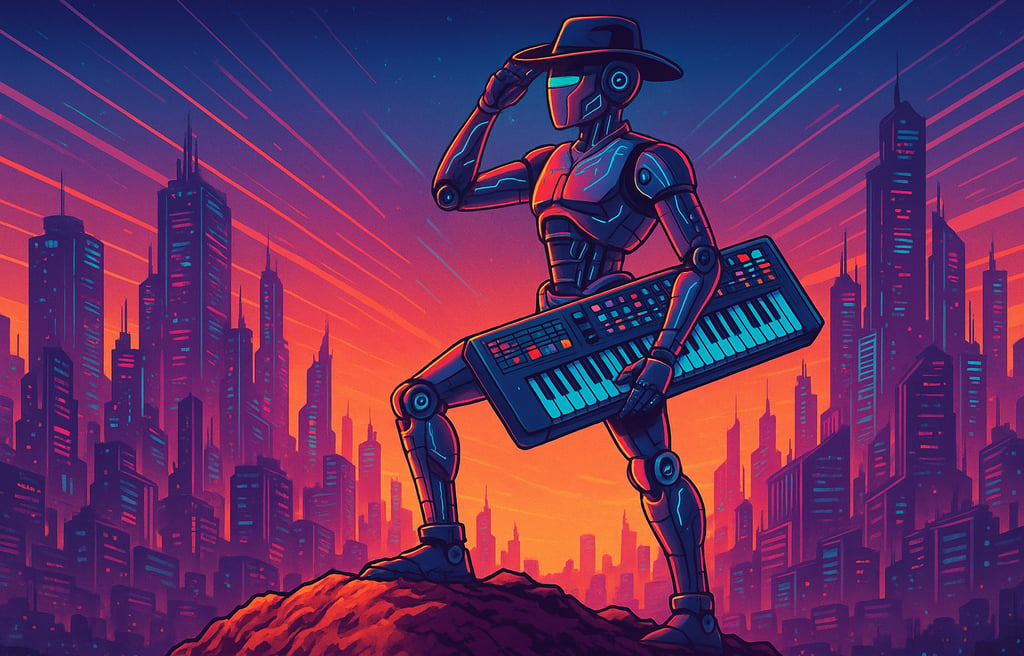
The Intersection of AI and African Music: Navigating Creativity and Technology
Emerging trends are likely to reshape the African music industry, driven by AI's capabilities. With personalized music recommendations and extensive data analysis, platforms are expected to cater more effectively to diverse audiences, enabling African artists to reach global listeners.
OPINIONSTECH & INNOVATION
Paul Fashanu
5/1/20255 min read


Understanding the Essence of African Music
African music represents a profound and diverse tapestry woven from the continent's rich cultural heritage. It is far more than mere entertainment; it acts as a vital medium for storytelling, preserving history, and expressing communal values. Each region boasts distinct sounds and styles, reflecting the unique identities formed through countless influences over centuries. Genres such as Afrobeat, Highlife, and Zulu music not only entertain but also serve critical social functions, facilitating communication among communities and passing down traditions through generations.
One foundational element of African music is rhythm, which is often characterized by complex polyrhythms that contribute to the music’s energetic feel. This rhythmic richness is complemented by the use of diverse musical instruments that vary from region to region. In West Africa, for example, the djembe and kora play significant roles, while the dholak and harmonium are prevalent in South Asian influenced areas. These instruments contribute distinctive sounds that evoke the emotional essence of the music, further anchoring it within the cultural context of the people who create it.
Storytelling remains a vital aspect of African music, with lyrics often addressing themes of love, struggle, family, and social justice. Through song, artists convey life lessons and reflect on societal issues, serving as both educators and entertainers. The interplay of these traditional elements showcases an inherent adaptability, allowing African music to merge seamlessly with contemporary influences and technologies. As modern platforms and tools emerge, traditional African music can maintain its essence while reaching new audiences, thus fostering a deeper appreciation for its cultural significance. In a world increasingly shaped by technology, it is essential to honor and understand this rich musical landscape as we explore its intersections with developments in artificial intelligence.
The Role of AI in Music Creation
Artificial intelligence has made significant strides in various fields, and music creation is no exception. The integration of AI tools in the music industry has transformed how artists and producers approach the composition, production, and enhancement of music. With advancements in machine learning and algorithms, AI can analyze vast amounts of data, enabling it to generate melodies, harmonies, and even entire compositions that reflect particular styles or genres.
AI-driven music platforms are emerging, catering to traditional and contemporary genres, including African music. Notable examples include platforms like OpenAI's MuseNet and AIVA, which provide users the ability to create music that aligns with specific cultural contexts or musical themes. These platforms not only allow for experimentation with new styles but also serve as educational tools for emerging artists who seek to understand the intricacies of composition. By providing suggestions for chord progressions and rhythms, AI facilitates a collaborative environment where human creativity can flourish.
Despite the promising advancements, the incorporation of AI in music production is not without its challenges. One significant concern among artists is the potential for AI to overshadow human creativity, leading to a homogenization of sounds and styles. Additionally, issues surrounding copyright and intellectual property rights arise when AI-generated music is involved. However, when used thoughtfully, AI can complement rather than replace human creativity, providing musicians with innovative tools to enhance their artistic process.
In summary, AI's role in music creation presents a dual narrative of opportunity and challenges. As the technology continues to evolve, its synergy with human creativity may unlock new dimensions in the music industry, enabling a richer and more diverse musical landscape.
Innovative Collaborations: AI and African Artists
The intersection of artificial intelligence and African music has birthed a myriad of innovative collaborations between musicians and technology, fostering a landscape rich in creativity and exploration. African artists are increasingly embracing AI tools, transforming their musical processes and redefining genres. One prominent example is the partnership between Nigerian artist Ayo Jay and a tech company that developed AI-driven music generation software. This collaboration allowed Ayo Jay to dive into exploratory soundscapes, crafting unique melodies that blend traditional African rhythms with contemporary beats, presenting a fresh take on Afrobeat and pop.
Another notable case is the work of South African producer Black Coffee, who has utilized machine learning algorithms to analyze patterns in his music and develop new sound structures. By incorporating AI into his production workflow, he has been able to push the boundaries of house music, creating tracks that resonate with both local and international audiences. The synergy between musicians and AI not only elevates their work but also expands their artistic vision, allowing them to experiment without the limitations previously imposed by conventional music production techniques.
The influence of AI tools extends beyond mere sound manipulation; they have also enhanced the creative freedom of African artists. By leveraging AI, musicians can access a broader range of production techniques and compositional styles, leading to diverse musical outputs. This shift is evident in collaborations such as the one between Ghanaian musician M.anifest and an AI music platform that fosters user-generated content. The blend of M.anifest's lyrical prowess with AI-generated music facilitated a new genre that resonates deeply within and beyond the African continent.
In conclusion, the collaboration between AI and African musicians presents a transformative opportunity that broadens the artistic horizons for creators. These innovative partnerships are not only shaping the music industry landscape but also reshaping the global perception of African music, enabling artists to reach wider audiences while preserving their unique cultural identities.
The Future of African Music in an AI-Driven World
The future of African music stands at a dynamic intersection of tradition and innovation, largely influenced by the advances in artificial intelligence. As technology continues to evolve, African musicians are presented with unique opportunities to blend their rich musical heritage with cutting-edge tools. The integration of AI in music production can pave the way for new sounds, innovative compositions, and greater accessibility to diverse audiences. Nevertheless, it is crucial to strike a balance between embracing technological advancements and preserving the cultural essence that defines African music.
While AI can facilitate creative expression, it poses challenges that artists must navigate, particularly regarding copyright and ethical implications. As AI technologies increasingly contribute to music creation, issues surrounding authorship and intellectual property rights are arising. Musicians may find themselves grappling with questions about originality in a landscape where AI-generated music can replicate styles and genres. Consequently, safeguarding the rights of artists must remain a priority, ensuring that musicians are correctly credited and compensated for their contributions.
Emerging trends are likely to reshape the African music industry, driven by AI's capabilities. With personalized music recommendations and extensive data analysis, platforms are expected to cater more effectively to diverse audiences, enabling African artists to reach global listeners. The rise of virtual performances, powered by AI and augmented reality, may redefine how artists engage with fans. Thus, adaptability will be crucial for African musicians in this evolving landscape. Embracing technology does not diminish the value of traditional music; rather, it can enhance access to and appreciation for African musical forms on international stages.
In conclusion, the trajectory of African music in an AI-driven world is filled with both promise and challenges. By maintaining a thoughtful approach to integrating technology, while honoring traditional elements, African musicians can navigate this complex terrain effectively, ensuring their artistry thrives in the modern age.
© hot new afro entertainment ltd. All Rights Reserved.


